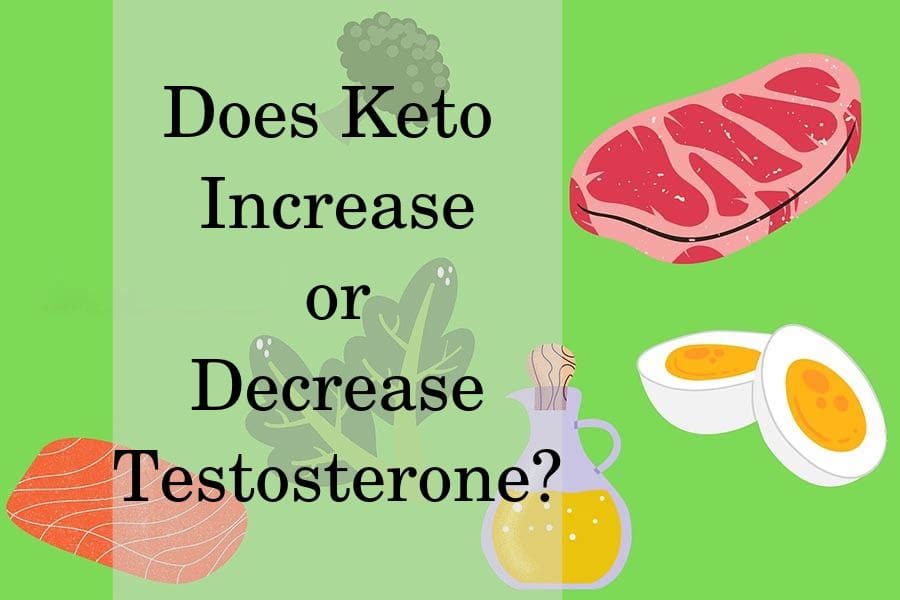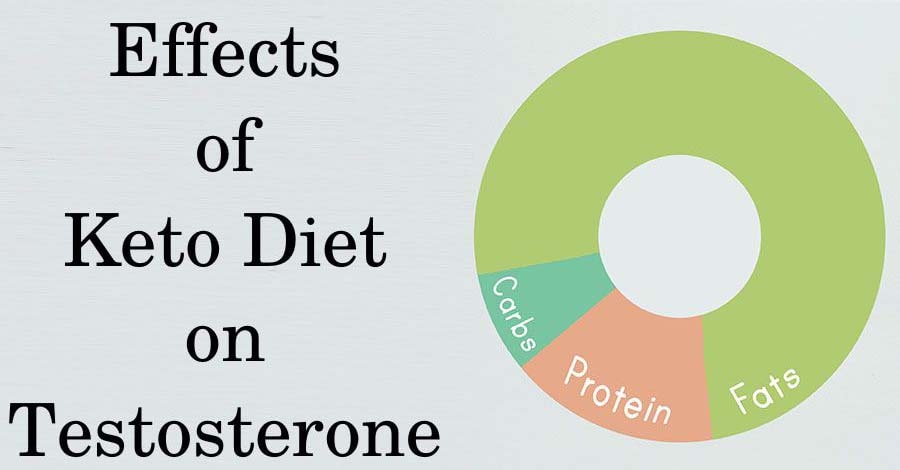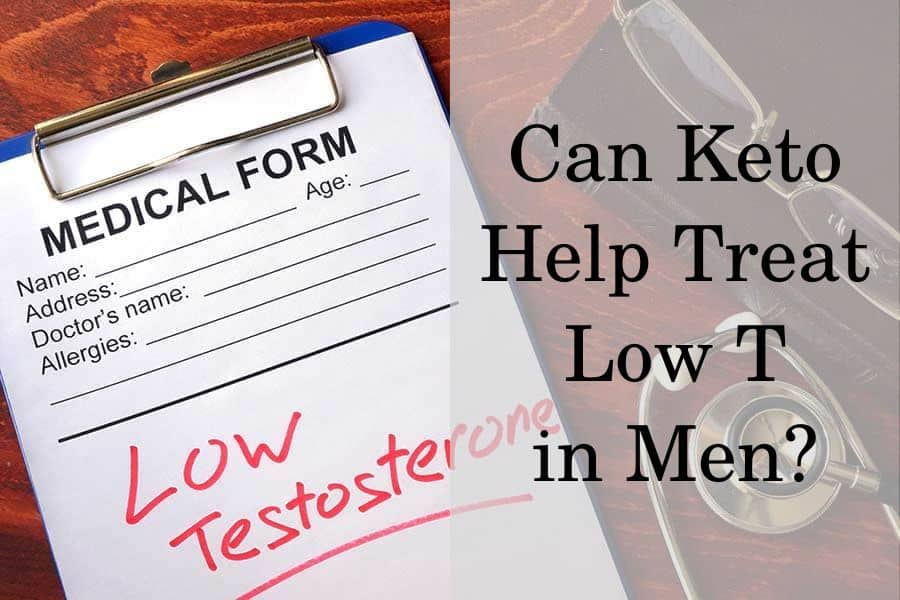The ketogenic diet, also known as а high fat, very low carb diet or simply keto, has grown in popularity mainly as a tool to lose weight and fuel the brain with ketones.
Indeed, the main effects men expect from the keto diet are losing weight and achieving a better physique. What is more, some hope to improve their cognition and focus, boost their metabolism and achieve other health benefits.
Although there is plenty of research supporting the short-term weight loss benefits of keto, most other effects of the diet are studied poorly. In fact, one of the least studied areas regarding keto is when it comes to hormones.
There is some evidence that the keto diet may improve the levels of testosterone in obese men. Unfortunately, studies regarding the effects of keto in men with normal body weight are conflicting.
What is more, research suggests that consuming carbohydrates may actually play a role in maintaining normal T levels in men, making keto a substandard dietary choice for boosting testosterone.
In this article, you will discover more about the potential benefits and risks of ketogenic diets on male hormonal balance and testosterone.
Real effects of keto on testosterone
According to the research we have so far, the effect of the keto diet on testosterone in men may depend on the body composition of the person.
Studies in men who are overweight or obese report that the keto diet can result in significant weight loss which also leads to an increase in serum testosterone levels.
Weight loss can help increase T levels in healthy men with above-average body fat percentages. That’s because fat tissue is a source of aromatase – an enzyme that converts testosterone into estrogen.
In turn, the estrogen sends negative feedback to the pituitary-gonadal axis and decreases testosterone synthesis.
The main goal of the keto diet is to lose weight while being in ketosis
Ketosis is a state when the body is not getting enough carbohydrates for the production of glucose, so it starts converting both dietary and body fats into ketones. Ketones can be used by the brain and other tissues for fuel, instead of alongside blood glucose.
Therefore, a major principle of the ketogenic diet is the complete restriction of foods high in carbohydrates and their replacement with foods high in fat. In fact, keto dieters need to follow a specific ratio of macronutrients to achieve ketosis which is:
- carbohydrates – 5-10% of daily calories
- protein – 10-20% of daily calories (higher protein intake would allow the body to convert proteins into carbohydrates)
- fats – 75-85% of daily calories
A major weight loss advantage of the keto diet is the fact that ketones have appetite-suppressing effects on the brain. High-fat foods can be quite satiating as well.
But by restricting carbs, most keto dieters also unintentionally restrict their energy intake even more due to the fact that there are simply fewer food options to choose from. This usually leads to an energy deficit which inevitably results in fat loss and a decrease in body weight.
Note that the rapid weight loss commonly seen in people on the keto diet is also due to the loss of body water and glycogen
There are also studies in resistance training men with average or above average body fat showing that 11 weeks of keto resulted in an increase in total T levels by 118 ng/dl on average compared to a −36 ng/dl decrease in T levels of men on a western diet.
We should also note that the participants on the keto diet had higher starting body weight, higher variability in their weight and also experienced higher weight loss compared to the control group.
Is keto always good for testosterone?
While losing excess fat is beneficial for men with obesity, the ketogenic diet may not affect or may even decrease T levels in lean men who already have normal body weight and low body fat percentage.
A recent literature review reports that the evidence is mostly mixed when it comes to men with normal body weight and high physical activity – there are studies showing an increase, a decrease, or no effect at all.
What is more, a meta-analysis of 27 studies that included more than 300 men with normal BMI reported that following a ketogenic diet resulted in a significant decrease in testosterone levels.
Research also reveals that adequate carbohydrate intake may be important for normal testosterone synthesis, especially amongst active men.
Can you treat low T with keto?
Currently, there is no evidence to suggest that the keto diet may help men suffering from male hypogonadism and low testosterone, except if it’s related to morbid obesity.
If you have normal or low body weight and suffer from hypogonadism, a keto diet may even worsen the condition as caloric restriction has been shown to decrease the natural testosterone synthesis.
High-fat diets also do not appear to increase testosterone levels more compared to high carbohydrate diets. That is because cholesterol is crucial for testosterone synthesis and both carbs and fats are substrates for cholesterol synthesis in the body.
One small long-term study in men even showed that lowering fat intake from 40% to 30% and simultaneously increasing carbohydrate intake from 45% to 55% led to a significant increase in T levels compared to controls who stayed on the lower carb diet.
Therefore, a good balance between fats and carbohydrates may be more favorable for testosterone synthesis rather than a high-fat, low-carb diet.
The ketogenic diet may help only men with obesity-related low T. The condition is also known as obesity-induced hypogonadism or MOSH (Male Obesity Secondary Hypogonadism) syndrome.
MOSH occurs when there is morbid obesity and the excess fat leads to the conversion (aromatization) of most of the testosterone into estrogen.
In one small trial with obese men following a low-carb high-fat diet, losing 15% of body weight was associated with a mean increase of 218% in total testosterone levels. The benefits were achieved within 3 months. Furthermore, the improvements can be permanent, as long as you maintain your healthy body weight following the keto weight loss.
Previous systematic reviews of the literature also confirm the potential of the ketogenic diet for increasing testosterone levels in obese men. The keto diet can help overweight and obese men achieve average testosterone levels by age.
It is important to note that the ketogenic diet is just one of the tools which men with MOSH can use to help them lose weight and improve their T levels.
Can you do keto while on TRT?
Generally, it is safe to follow a keto diet during your testosterone replacement therapy (TRT), unless you have contraindications (such as liver, pancreatic, or gallbladder diseases).
TRT is currently the most widely recommended medical therapy for low T and it is effective in all forms of hypogonadism, and now you can even get testosterone therapy online in 5 easy steps.
A combination of TRT and a keto diet may help for a faster recovery in patients with MOSH syndrome. That is because TRT can also help men lose weight thanks to the catabolic effects of T on adipose tissue.
However, the keto diet is not likely to improve or speed up the effects of TRT, unless your hypogonadism is obesity-related. High-fat, low-carb diets will also not affect the risk or severity of potential side effects you may experience from TRT such as infertility.
What is more, any other weight loss diet that leads to an energy restriction and caloric deficit can also help speed up the results in men with MOSH syndrome.
Therefore, there is no reason to believe that the keto diet is the best or holds any advantage over other diets for men with low T and those on TRT.
What keto food is the most effective for testosterone?
As previously mentioned, dietary fats are one of the substrates which your body can use for cholesterol and testosterone synthesis.
Foods that are both keto-friendly and can provide your body with nutrients for normal testosterone synthesis include:
- fatty fish and other sources of omega 3
- olive oil and other sources of omega 9
- lean meat
- eggs
Animal foods such as fatty fish and eggs are also rich in dietary cholesterol which can also be used by your body for testosterone synthesis.
Yet, it is important to note that you should consume foods such as red meat in moderation as experts recommend no more than 2 servings per week. That’s because excessive red meat consumption may have potential risks such as carcinogenesis, although more research is needed.
If you are looking for keto-friendly foods, it is important to note that not all high-fat foods fall within this category. For example, fried foods are high in fat, but also high in carbs and calories, which makes them unsuitable for neither keto nor weight loss.
Processed meat can also be classified as a high-fat food, but it is better avoided due to its high-calorie content, as well as the presence of carcinogens that form during the processing.
Another group of foods to avoid altogether includes anything containing trans-fatty acids. These types of fats are artificially manufactured and are known to increase the risk of chronic conditions in humans such as heart disease. They can be found in margarine and margarine-containing foods such as sweets.
Get a free consultation with our medical expert for any questions about hormone replacement therapy



